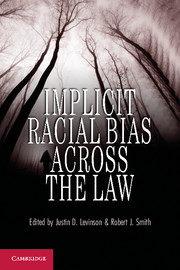Book contents
- Frontmatter
- Contents
- Contributors
- Acknowledgments
- Implicit Racial Bias Across the Law
- Introduction Racial Disparities, Social Science, and the Legal System
- 1 Implicit Racial Bias
- 2 Property Law
- 3 Criminal Law
- 4 Torts
- 5 Employment Law
- 6 Health Law
- 7 Education Law
- 8 Communications Law
- 9 Corporations Law
- 10 Tax Law
- 11 Intellectual Property
- 12 Environmental Law
- 13 Federal Indian Law
- 14 Capital Punishment
- 15 Reparations Law
- Index
- References
Introduction - Racial Disparities, Social Science, and the Legal System
Published online by Cambridge University Press: 05 June 2012
- Frontmatter
- Contents
- Contributors
- Acknowledgments
- Implicit Racial Bias Across the Law
- Introduction Racial Disparities, Social Science, and the Legal System
- 1 Implicit Racial Bias
- 2 Property Law
- 3 Criminal Law
- 4 Torts
- 5 Employment Law
- 6 Health Law
- 7 Education Law
- 8 Communications Law
- 9 Corporations Law
- 10 Tax Law
- 11 Intellectual Property
- 12 Environmental Law
- 13 Federal Indian Law
- 14 Capital Punishment
- 15 Reparations Law
- Index
- References
Summary
Discussions of race in the United States have taken on an optimistic tone, led by confident commentators who tout America's successful retreat from its racist past. This new, hopeful dialogue comes complete with factual support. For example, racial minorities have reached the pinnacle in government and leadership roles, which positions them atop traditionally Caucasian hierarchies; instances of overt racism have been declining for decades; and America's diverse and multicultural society keeps growing, affording new educational and job opportunities to traditionally disadvantaged peoples. Without a closer look, one could embrace this new vision of race in the United States without seeing or considering an ominous subterranean context.
Yet a deeper examination reveals the complexity of America's racial challenges and the legal system's unwitting complicity in the persistence of racial disparities. America's racial progress does offer comfort if viewed in isolation (after all, declining overt racism is something to embrace), but it also obscures systematic racial bias that forges ahead, undeterred. Massive racial disparities in America persist – in the criminal justice system, in economic advancement, in property ownership, and beyond. Consider the incarceration statistics: despite comprising only about 13 percent of the population, today African Americans make up almost 50 percent of the incarcerated. Economic figures similarly do little to comfort those who hope that equality has been achieved: African American and Latino families are disproportionately likely to be in the bottom fifth of Americans based on earnings per family. The story of property ownership is not much better: fewer than half of African American and Latino families are homeowners compared to 75 percent of Caucasian families.
- Type
- Chapter
- Information
- Implicit Racial Bias across the Law , pp. 1 - 8Publisher: Cambridge University PressPrint publication year: 2012



